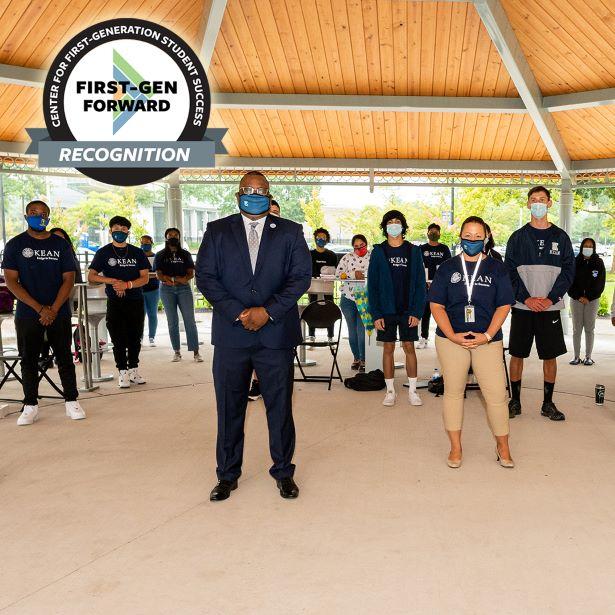Kean Designated a First-gen Forward Institution

Kean University has been recognized as a First-gen Forward Institution by the Center for First-generation Student Success for its support and advancement of students who are the first in their families to attend college.
The Center, the premier source of evidence-based practices, professional development, and knowledge creation to advance the success of first-generation college students, is a joint initiative by NASPA—Student Affairs Administrators in Higher Education and the Suder Foundation.
“As a former first-generation college student myself, this is a proud moment for me,” said Kean President Lamont O. Repollet, Ed.D. “I know firsthand the potential of first-generation students and the challenges they face. Kean provides them with the resources, mentorship and support they need to make their dream of earning a college degree a reality.”
The First-gen Forward designation recognizes institutions of higher education that have demonstrated a commitment to improving experiences and advancing outcomes of first-generation college students. Selected institutions receive professional development, community-building experiences and a first look at the Center’s research and resources.
“First-gen Forward now recognizes and supports over 200 diverse institutions across three cohorts, all of which continue to lead the nation through their commitment to first-generation student success. We are pleased to welcome Kean University for its long-term commitment and demonstrated strategies for advancing first-generation student initiatives,” said Sarah E. Whitley, Ph.D., assistant vice president, Center for First-generation Student Success.
First-generation students make up more than 46% of Kean’s student population — greater than the 33% national average reported by the U.S. Department of Education.
Kean’s Division of Student Success and Retention offers a number of programs, workshops and events to support first-generation students, including the First Gen Scholars Mentorship Program, which connects first-generation students with alumni mentors. The one-to-one mentorship supports a smooth transition for the students, academically and socially, as they navigate college life.
“I am excited that Kean University is being recognized nationally as an institution that provides key high-impact services to assist our first-generation students with climbing the mountain that is higher education,” said Barbara Harmon Francis, vice president of Student Success and Retention at Kean and a former first-generation college student. “At Kean, we are their guide to climbing higher. We will be there to support our students’ success.”
Elvis Gyan, managing assistant director of retention initiatives and a former first-generation student, oversees the mentorship program.
“This designation further demonstrates that Kean University has been intentional about cultivating a safe space for first-gen students to thrive and excel at the university,” he said. “From my own experience, I know that first-gen students often struggle when left on their own. Kean is committed to developing resources and programs that provide an additional layer of support for them.”
Kean has an array of academic support programs for all students, including tutoring, writing and public speaking services, and Kean’s Supplemental Instruction (SI) program. It places SI leaders — students who already excelled in challenging courses — in those classes as mentors, tutors and role models.
Kean, which has the lowest tuition and fees in New Jersey, also is a leader in the use of Open Educational Resources (OER) in its courses. OER materials are free to use and help students lower the cost of a college education by saving money on textbooks.
NASPA—Student Affairs Administrators in Higher Education is the leading association for the advancement, health and sustainability of the student affairs profession. Its work provides high-quality professional development, advocacy, and research for 15,000 members in all 50 states, 25 countries, and eight U.S. territories.